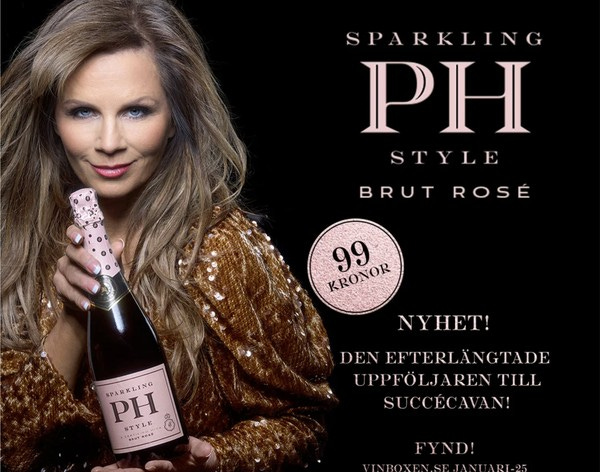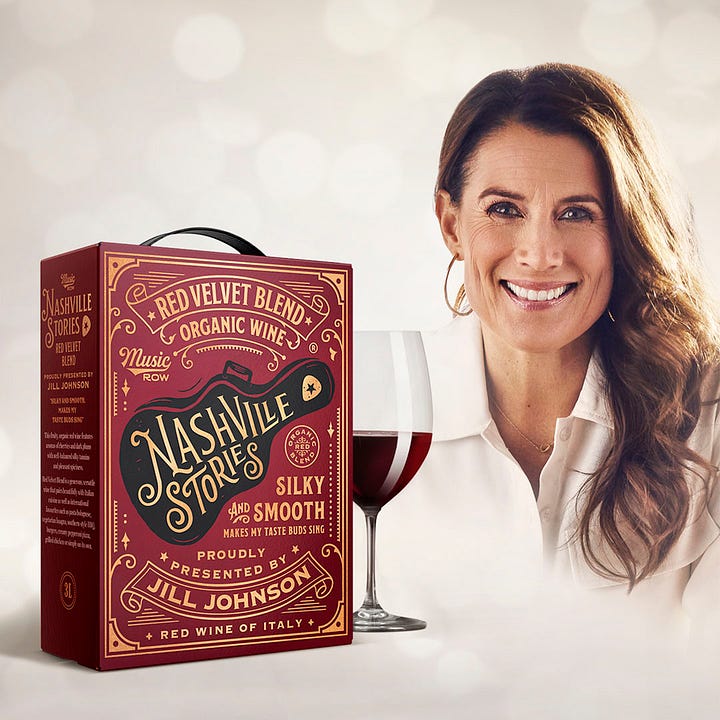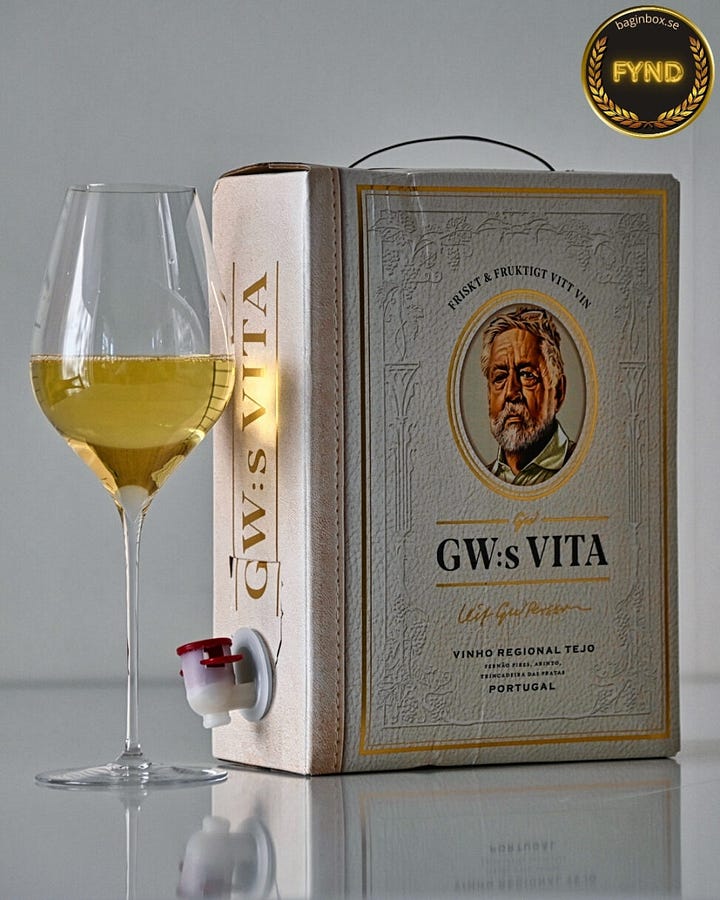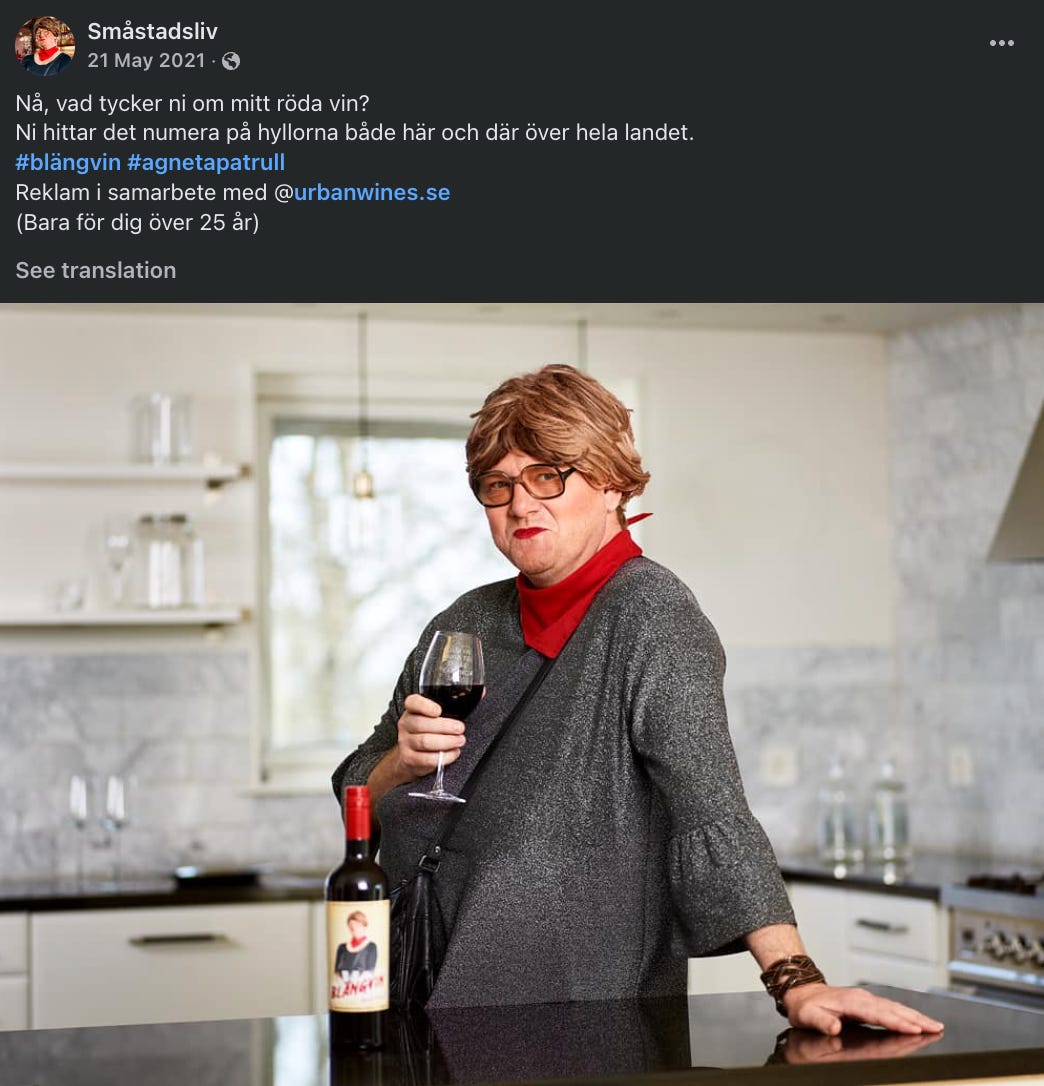In Vino, Celebritas - Part One
What connects a row on Swedish television, the UK Royal family, and the UK's top selling premium wine brand? And why oh why oh why is do people buy this stuff? Turns out - for very good reasons.
Whenever I want to answer a knotty marketing question I go and read a chapter or two of “Mythologies” by Roland Barthes. There are two benefits of consulting a French literary theorist and semiotician. One is that you come at the problem with a different perspective to everyone else because, well, who the hell answers business problems with reference to French literary theorists and semioticians? The other reason is that he’s usually right.
Of course, I don’t like to be too narrow in how to tackle problems. So a chapter or so of
usually helps. And as well. All of whom are immensely useful in helping answer the question at the heart of the three posts - why on earth do people buy celebrity wines? They’re also pretty useful - along with Will Storr and Pierre Bourdieu on why on earth are people so keen to put their name them?Over the next three posts I’m going to draw on all of these people (and more) in tackling the both questions. Because - although celebrity wines appear to be a flibbertigibbet frippery of modern society1 they’re also a surprisingly instructive lens into why people buy and make wine at all.
Knowing all this is also surprisingly useful for anyone making or selling wine. Which is sort of the point of writing about it in the first place.
Sweden - A Global Laboratory for Covid and Celebrity Wine
Sweden was the only major European economy that didn’t adopt lockdowns as a way of tackling the Covid pandemic2. As a result today Sweden’s economy and educational outcomes for children are the subject of intense study. Not least because it seems to suggest lockdowns did more harm than good.
Sweden’s unusualness in another respect also makes it a fascinating case study. Sweden is not the only country in the world with a state run alcohol monopoly. But the monopoly - Systembolaget - is an embedded part of Swedish life, and is coupled with a population that are broadly keen and enthusiastic wine drinkers
I contend that this is partly why Sweden is also a global leader in celebrity wines.




The celebrities with wines in Sweden are not necessarily celebrities non-Swedes would know. Save perhaps for Måns Zelmerlöv (above) who won The Eurovision Song Contest. But they do include some I have met (Lena Philipsson and Jill Johnson - also above) and an ex-cop who wrote in his autobiography about trying to poison his own mother (GV Persson - also above) who surely surely has a unique claim to shame among the world’s winemakers.
Not all Swedes are happy about this. Not least one of the country’s leading wine journalists, Alf Tumble. Tumble was recently on the country’s main morning news programme arguing that too many of the country’s wines come from anonymous producers and simply have confected brand names or celebrity associations on them3. He also argued that the country’s monopoly retailer - Systembolaget - has a duty to provide greater transparency about these wines so people could understand what they were drinking and make more informed choices.
Here he is - in Swedish - and also in a paywalled article:
The response has been two-fold and vigorous.
Alf’s fans, who are largely “wine lovers”, are delighted. And you can see the support in the comments on the Instagram post. “Så jävla asbra” literally translates as “so devil dude good” which gives you a general sense of the sentiment4.
The country’s wine importers are less supportive. I suspect that’s because the people they sell to aren’t “wine lovers” but more “most people”. “Wine lovers” are people who are really, really into wine and spend time reading critics like Alf Tumble (or me). But “most people” just want a glass of something wet and reliably tasty to help them wind down at the end of the day.
Those importers have to sell to millions of “most people” through the country’s monopoly retailer, Systembolaget. And that - I believe - is why they are much keener on celebrity wine brands. And while Sweden’s monopoly retailer is not unique, it’s unusual enough to give us a Covid-lockdown-like testbed to understand the appeal of celebrity wine.
Optimisers listen to critics - satisficers make do with celebrities
Think of a thing you’re really into. And by this I mean “a thing you’re into more than other people”. Cars maybe, or novels, makeup, trainers, TV’s, fishing rods, cameras, heritage tomatoes… wine. Whatever that thing is you’re an optimiser or maximiser for whatever that thing. You spend time finding the best one. And you’re prepared to put in the hard yards of research and trial-and-error to find it.
Now think of everything else. Which is probably most stuff. For that you’ll most likely be a satisficer. You’re not fussed about the best tomato. You just want one that’s guaranteed not to be shit. The best trainers…? You’ll probably choose a pair that someone recommends.
Most things we buy, most of the time, are the ones where someone we trust says “I find this one is usually okay”. That’s a satisficer choice. Most things we buy aren’t because we spent a long time researching them or trying to find the very best. We bought them because someone we know, or in a shop, said “well I quite like this one”.
Except you can’t do that in wine shops in Sweden.
Sweden’s wine, beer, and spirits shops are run by the state. And like most state-run things they have lots of rules. And the whole point of Sweden’s alcohol stores is to make alcohol available… but not to promote it. It’s a delicate balance. So if you ask the sales assistants for advice they will advise on what fits your budget. Or a wine that’s a bit like the last one you said you enjoyed. Or a wine that goes with you supper. But they’re not meant to say “I tell you what, this wine is fabulous. I really enjoyed it and I think you will too.”
Which - it turns out - is what we’re really looking for.
Celebrity wines aren’t good, but they’re guaranteed not to be shit
So what do you do if you live in country where the person you’d normally ask for a heartfelt recommendation - the sales assistant - isn’t allowed to give it to you?
You think of someone else you trust. And someone who is guaranteed not to give you a shit recommendation.
Most “wine people” probably get the first part of that. They understand that people trust celebrities. (Although as we’ll see in the next post, and thanks to the work of Grant McCracken, it’s not quite as simple as that. They trust some celebrities when it comes to wine, but it’s not immediately easy to predict which ones.)
But most “wine people” - and I include Alf Tumble here - don’t get the second part of that. “But celebrity wines are shit” they’ll say. But this is where our optimiser/satisficer divide comes in.
Very few celebrity wines are particularly good. In the next post we’ll look at one that genuinely was. It was one of the most highly regarded wines in the country. And it was a flop. But if you’re a fan of Jill Johnson (like my mother-in-law) you know that Jill Johnson is not going to put her name to something objectively awful. And that’s what you’re looking for. Something wet, reliably tasty, and not objectively awful.
Alf Tumble is cross - and not unreasonably - that these wines don’t say who made them, where they made them, exactly how they made them, and if they possibly made other wines that are similar or even identical but sell more cheaply without the celebrity name.
But for most wine drinkers their response is “Yes? So what?”
If you’re one of the people buying a celebrity wine, you don’t care. You don’t want to do research into every bottle you buy. And the sales assistant in the shop isn’t allowed to rave about the wine they had last week that you might like too. For your purposes, the best thing is to buy the one made by the guy you see talking gruffly about TV crime on the morning news programme. You’ll even overlook the fact he said he tried to poison his mother in his autobiography.
The case of Blängvin Agneta Patrull
Småstadsliv means “small town life”. It is also the name of a hugely popular sketch and comedy show from the far north of Sweden. For British readers, imagine something like Mrs Brown’s Boys. It’s a blend of childish and sometimes vulgar jokes and “genial nonsense”.
The show features Ingemar (a sensitive and easily hurt excavator operator), ther’s a reclusive hunter who is passionate about coffee, Sölve (an elderly, confused event organizer) and others including Agneta Patrull. A woman, played by a man. (British readers will now get the reference to Mrs Brown’s Boys).
In 2021 the Swedish importer Urban Wines released a selection of wines featuring Agneta Patrull. On the day of release the show’s social media channels put out a single post. The company immediately sold out a container of wine
.
Not a pallet. A container. All from a single Meta post from a modest TV show set in Northern Sweden. At this point “wine people” will say “well, was the wine any good?”. Ignoring the fact that what is meant by “good” is - here at least - relative. Of course it was “good”. Thousands of Småstadliv fans wouldn’t have bought the wine if it wasn’t “good”. It was good enough that they bought follow up releases too. But what people understand by “good” wine depends on who you are.
This is something the wine business is tediously slow at recognising. “All that matters is the liquid in the bottle” is spoken like it’s a verse from the Bible. Except it’s not true. It’s true for you - the wine person - but not for most people. And most wine shoppers are “most people”.
Fortunately for the world, we have Sweden’s exceptional response to Covid to help us understand how better to manage future pandemics. Fortunately for the wine world we have Sweden’s state run wine shops to help understand what really drives people into the arms of celebrity wine brands. And if wine producers are smart about it they can learn why people buy them, and use some of those lessons to sell their own “better” wines too. Rather than just complaining about it.
In Sweden people buy celebrity wines because the thing they really want - a heartfelt recommendation from someone they trust - isn’t available. So they go for the next best thing. This has profound consequences for anyone selling wine. In fact selling anything. Insiders obsess over making it great. Most buyers flock to the one that gives them a quick and ready reassurance that it won’t be shit.
In the next post - for paid subscribers - we’ll lift the hood anthropologically on celebrity wines to see how they work. And how very often they don’t - look away now Ringo Starr and Lord Botham. And in a third post we’ll look at what drives people to launch celebrity wines. From actors, detectives, pop stars, and even a duchess… what is it about having your own wine label that’s so appealing?
In fairness they are that too.
I know, because I emigrated to Sweden in the middle of it all. Useful tip, don’t emigrate across Europe with a two-year old and a dachshund in the back of your Skoda in the middle of a pandemic.
The clip is in Swedish, but English speakers will catch Tumble being furious about “Crazy Cat”, one of the many cat-related wines on sale in Sweden. My personal favourite of this genre is “Hippy Cat” on the basis that he looks like he’s just been to Woodstock.
As well as the challenge of learning Swedish for migrants like me.








So Mr Tumble is Sweden's top wine journalist? I refuse to believe this.
“a thing you’re into more than other people” In my case cricket and wine. But my batting is not that good and, while we all like to win, at 70+ if we lose then the game, and the drinks after, are the thing. On Friday I bought a AUD100 Pinot Noir. Tonight a $20 Marsanne from my favorite producer, Tahbilk, will be fine. Everything does not have to be exceptional in my world.